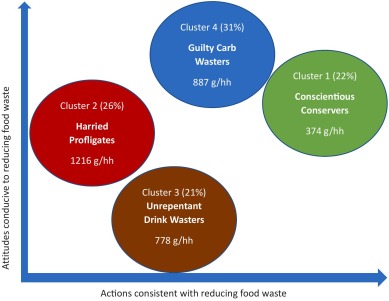What is Your Food Waste Pattern – Conscientious Conserver or Harried Profligate?
By Miles Baker
U.S. consumers waste a lot of food – about 30% of what they buy! However, not all households are alike when it comes to waste amounts and patterns, and understanding these differences can guide food waste reduction campaigns and interventions. An open-access article titled “Segmenting U.S. consumers by food waste attitudes and behaviors: Opportunities for targeting reduction interventions” by Ph.D. candidate Ran Li and Dr. Brian Roe appears in the March 2024 issue of Sustainable Production and Consumption. The primary impact anticipated from this research is to inform and guide the development of effective communication campaigns and interventions targeting consumer food waste reduction by identifying segments of U.S. consumers with similar food waste attitudes and behaviors, understanding how these segments differ in their potential to reduce household food waste, and identifying the specific challenges that need to be addressed for effective waste reduction. A companion Communications Planning Resource Guide is available that provides additional messaging, content, and potential tactics that could be deployed to affect behaviors regarding food waste among two identified clusters of consumers.

Two key takeaways the authors hope will come out of this report:
- Identification of Key Consumer Segments and Their Impact on Food Waste
We identify four distinct consumer segments: Conscientious Conservers (22 % of households, 10 % of total food waste generated), Harried Profligates (26 % of households, 38 % of waste), Unrepentant Drink Wasters (21 % of households, 10 % of waste), Guilty Carb Wasters (31 % of households, 33 % of waste). This categorization is crucial for understanding where interventions can be most effectively applied.
- Strategic Recommendations for Reducing Food Waste
We recommend strategies that focus on changing the behavior of two largest segments – Harried Profligates and Guilty Carb Wasters – due to their significant contribution to overall food waste. These segments share attitudes that are favorable for food waste reduction, such as viewing food waste as a critical issue and feeling guilt about wasting food. However, some of their behaviors are less conducive to food waste reduction, which can be attributed to factors like time constraints and a lack of effective planning skills. By acknowledging and addressing these common characteristics, interventions can be more effective in inducing behavior change by supporting these clusters’ lack of planning skills in a manner that does not exacerbate the time pressure they report facing in day-to-day life.
To access the paper: https://www.sciencedirect.com/science/article/pii/S2352550924000150
